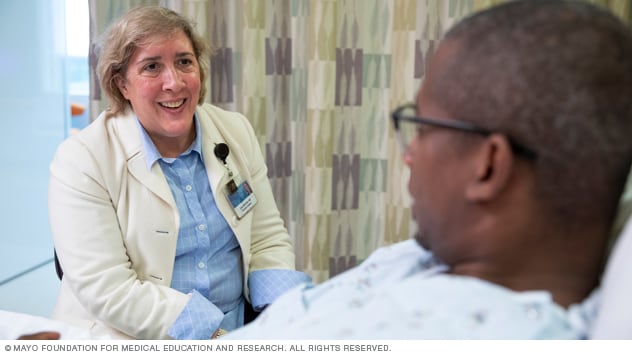 Team-based care focused on you
Team-based care focused on you
Nurses are part of an interdisciplinary team committed to ensuring you get the bedside care you need.
The right care the first time
People turn to Mayo Clinic for help with a wide range of serious and difficult-to-diagnose infectious diseases. Each year Mayo Clinic's infectious diseases specialists diagnose and treat more than 18,000 adults and children from around the world. During the first year of the coronavirus disease 19 (COVID-19) pandemic, the clinic treated more than 5,000 people with the virus and had one of the lowest mortality rates in the United States (about 1% compared with a national average of about 2%).
Our infectious diseases experts help people with bacterial, fungal, viral and parasitic infections. That includes bloodstream infections and complex or rare conditions caused by emerging infectious diseases and multidrug-resistant microbes. Successful treatment starts with an accurate diagnosis. Our doctors take the time to get it right.
Leadership through the COVID-19 pandemic
Mayo Clinic Laboratories
Mayo Clinic Laboratories is a complete reference laboratory for specialized lab testing.
Learn more.
Mayo Clinic Connect: Infectious diseases
History of infectious disease outbreaks and vaccines timeline
Mayo Clinic demonstrated a strong commitment to its patients, staff and values during the COVID-19 pandemic. The infectious diseases team was critical to the clinic's successful response to this crisis. The clinic rapidly implemented new models of care that used remote monitoring and telehealth visits. Infectious diseases specialists met daily to plan for the best possible treatments. The clinic established sites for testing and providing monoclonal antibody therapy as it became available.
Mayo Clinic was a worldwide leader in using monoclonal antibody therapy. This therapy significantly reduced the hospitalization rate and decreased mortality of people showing symptoms of infection with the virus that causes COVID-19. In addition, the clinic accelerated its remote monitoring capabilities to care for 9,200 COVID-19 patients, allowing people with mild to moderate symptoms to be cared for safely at home and to know when to come to the hospital for care.
Mayo Clinic researchers led the U.S. expanded access program for SARS-CoV-2 convalescent plasma, a trial that involved 12,000 physicians at 2,600 medical facilities across the U.S. The effort is estimated to have saved more than 40,000 lives in 2020. More than 90% of the people hospitalized for COVID-19 at Mayo Clinic participated in clinical trials. Our research model moved new research findings into the clinical practice quickly and safely.
Infectious diseases doctors and team-based care
Many infectious disease problems are often related to other medical conditions. Our infectious disease specialists work closely with doctors in many specialty areas to make sure you get exactly the care you need. Depending on your situation, your care team may include doctors trained in cardiovascular medicine; critical care; dermatology; thoracic surgery; immunology; rheumatology; ear, nose and throat and head and neck surgery; hematology; oncology; pulmonary medicine; gastroenterology and hepatology; neurology; neurosurgery; transplant; orthopedic surgery; pathology; surgery, or vascular surgery. Your doctors may also work with an infectious disease pharmacist, a nurse, a microbiota transplant coordinator and an advanced practitioner.
Having all this expertise in a single place, focused on you, means that you're not just getting one opinion. Your care is discussed among the team, your test results are available quickly and appointment schedules are coordinated. Highly specialized experts are working together for you. What might take weeks or even months to accomplish elsewhere can typically be done in a matter of days at Mayo Clinic.
Infectious diseases doctors at Mayo Clinic’s campus in Rochester, Minnesota, are part of the Division of Public Health, Infectious Diseases and Occupational Medicine. It’s made up of specialized medical experts committed to using the most effective and advanced approaches to preventing and treating infectious diseases, illnesses and injuries.
Infectious diseases doctors in this division help people with HIV, bone infections, and infections related to complications of cancer, transplant, critical care and many other conditions.
Infectious diseases services are also provided to children at Mayo Clinic's campus in Rochester, Minnesota. Pediatric infectious diseases specialists of the Mayo Clinic Children's Center work with other pediatric specialists to diagnose and treat children and adolescents.
Mayo Clinic Health System clinics, hospitals and health care facilities serve more than 60 communities in Iowa, Wisconsin and Minnesota. These sites provide Mayo Clinic infectious diseases services to their local communities.
Advanced diagnosis and treatment
 Infectious diseases consultation in the hospital
Infectious diseases consultation in the hospital
Mayo Clinic doctors ensure your questions are answered before surgery.
You may undergo diagnostic procedures so that your doctors can identify exactly what's causing your signs and symptoms. Mayo Clinic's infectious disease specialists work with clinical microbiology specialists who have developed advanced microbiological laboratory methods of detecting infections. They also work with radiologists who use innovative imaging technologies, including 7-Tesla MRI, magnetic resonance elastography and magnetic resonance angiography. Many of these advanced testing and imaging methods are available at only a very few medical centers.
Helping people who are hospitalized. Our infectious disease specialists work in teams to help manage the most complex infections encountered in the hospital setting.
Monitoring people who need transplants. People who plan to undergo a transplant may see an infectious disease specialist for a pre-surgical assessment of infection risk and to discuss prevention strategies. These include prophylaxis, preemptive therapy, surveillance and vaccination. People who receive a left ventricular assist device (LVAD) as a bridge to heart transplant can meet with this team as well to discuss managing infection risk.
Combating infectious diseases with eConsults. Doctors in Mayo Clinic Health System are connecting with colleagues in Rochester, Minnesota, using eConsults to improve care of patients with serious infections and diseases related to bacteria, viruses and parasites.
Focusing on infection prevention and antimicrobial stewardship. Our infectious disease doctors are committed to developing strategies to reduce the risk of infection after surgical procedures and in people who are hospitalized. In addition, they are expert in the optimal use of antimicrobials, which reduces the chance of developing drug resistance.
Contact
Arizona
Florida
Minnesota